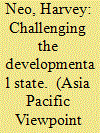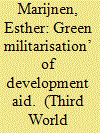|
|
|
Sort Order |
|
|
|
Items / Page
|
|
|
|
|
|
|
| Srl | Item |
| 1 |
ID:
078478


|
|
|
|
|
| Publication |
2007.
|
| Summary/Abstract |
Nature conservation efforts are often reactive to encroaching development plans and systematic conservation planning that is integral with development is not only uncommon, but is often fraught with difficulties even where it is actually attempted. Such obstacles to conservation are especially apparent in developmental states where state legitimacy is largely derived from the state's ability to develop the country. Among other things, developmental states place a premium on physical and economic development. This paper critiques, through the standpoint of nature conservation, the inadequate conceptualisation of `development' in the developmental state thesis. Specifically, this paper argues that the seemingly value-free (but ultimately economically based) underpinnings of development goals pushed by the developmental state needs to be tempered with a broader concern for the ethics of development. To that end, I draw on two case studies of nature conservation tussles in Singapore to show how alternative extra-economic visions of development have been articulated, notwithstanding the developmental state's monopoly on the discourse (and practice) of progress and development. The case studies, set in the heady economic growth of the early 1990s, will critique two related aspects of the developmental state: its `amoral' economistic conception of development and its use of growth and materialism as legitimacy
|
|
|
|
|
|
|
|
|
|
|
|
|
|
|
|
| 2 |
ID:
154073


|
|
|
|
|
| Summary/Abstract |
To ‘save’ the Virunga National Park, located in the east of the Democratic Republic of the Congo, the European Commission (EC) allocates development aid to the paramilitary training of the park guards, their salaries, and mixed patrols of the guards together with the Congolese army. Moreover, the ‘development’ projects the EC supports around the park have militarising effects as they are based on a soft counter-insurgency approach to conservation and to address dynamics of violent conflict. This amounts to the ‘green militarisation’ of development aid. This article describes how a personalised network of policymakers within the EC renders militarised conservation-related violence and controversy around the Virunga park invisible, by framing contestations and violence in and around the park as solely caused by economic factors and motivations. Moreover, by ‘hiding’ the fact that the EC aid is used to fund armed conservation practices, policymakers circumvent political debate about the use of development funds for (para)military expenditures. While the existing literature focuses on the importance of securitised discourses to explain the militarisation of conservation, this article indicates that in addition, it is important to focus on these more mundane practices of securitisation within international organisations that ultimately fund the militarisation of conservation.
|
|
|
|
|
|
|
|
|
|
|
|
|
|
|
|
| 3 |
ID:
120915


|
|
|
|
|
| Publication |
2013.
|
| Summary/Abstract |
Community forest management is often advanced as a remedy for failing top-down approaches to nature conservation. Contingent on the property rights theory, it assumes that local participation in natural resource management results in sustainable structures. There is, however, insufficient empirical evidence on the intra-community dynamics - especially when households have unequal access to the local institutions managing the natural resource. This paper looks at the socio-cultural, economic and institutional situation of households with and without access to management institutions in communities around the Kilum-Ijim Mountain Forest in Cameroon and analyses whether livelihood differences are associated with variations in management patterns. The analysis reveals differences by household type and a mixed picture of the evolution of species in the community forests over time, questioning the role of the community in natural resource conservation. Furthermore, the paper discusses the potentials of wildlife domestication for livelihoods and conservation in forest communities. The results are important in the light of ongoing conservation efforts in natural resource hot-spots in sub-Saharan Africa.
|
|
|
|
|
|
|
|
|
|
|
|
|
|
|
|
|
|
|
|
|